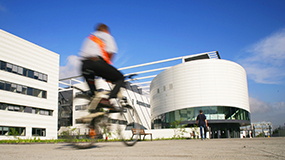 Recherche
Recherche
Laboratoires.Ecoles, Collège et Formation doctorales
Stratégie. Séminaires, colloques. Sciences et société
Réseaux et pôles d'excellence. Investissements d'avenir (Labex)
Summer School on CPS 2014
7 juillet 2014 ... 10 juillet 2014
Université Joseph Fourier, PERSYVAL-Lab, and NASA-JPL are organizing the second edition of the Cyber-Physical Systems Summer School.
The broad objective of the CPS Summer School is to explore the manifold relationship between networked embedded systems ("the internet of things") and humans as their creators, users, and subjects.
The format of the Summer School is a four days meeting, organized around different aspects of rigorous engineering of Cyber-Physical Systems.
Radu Grosu / Persyval-Lab
The technological developments of the past two decades have nurtured a fascinating convergence of computer science and electrical, mechanical and biological engineering. Nowadays, computer scientists work hand in hand with engineers to model, analyze and control complex systems, that exhibit discrete as well as continuous behavior. Examples of such systems include automated highway systems, air traffic management, automotive controllers, robotics and real-time circuits. They also include biological systems, such as immune response, bio-molecular networks, gene- regulatory networks, protein-signaling pathways and metabolic processes.
The more pervasive and more complex these systems become, the more is the infrastructure of our modern society relying on their dependability. Traditionally however, the modeling, analysis and control theory of discrete systems is quite different from the one of continuous systems. The first is based on automata theory, a branch of discrete mathematics, where time is typically abstracted away. The second is based on linear systems theory, of differential (or difference) equations, a branch of continuous mathematics where time is of essence. This course is focused on the principles underlying their combination. By the end of this course the students will be provided with detailed knowledge and substantial experience in the mathematical modeling, analysis and control of hybrid systems.
Subject
Hybrid automata as discrete-continuous models of hybrid systems. Executions and traces of hybrid automata. Infinite transition systems as a time-abstract semantics of hybrid automata. Finite abstractions of infinite transition systems. Language inclusion and language equivalence. Simulation and bisimulation. Quotient structures. Approximate notions of inclusion and simulation. State logics, and model checking. Partition-refinement and model checking within mu-calculus. Classes of hybrid automata for which the model-checking problem is decidable. Modern overapproximation techniques for reachability analysis.
Mots clés : persyval-lab
Informations
- Gricad Vidéos
- 1 janvier 2021 00:00
- Conférences
- Français

